|
British
Columbia "Restricted" License Plates

| Q:
|
"Why
did the utility vehicle cross the road?" |
| A:
|
"Because
it was properly registered as a vehicle of unusual size,
weight or operating characteristics under the Motor
Vehicle Act; it was being used for transportation on
a limited access island and was of a type designed not to
be ridden astride; and it was being operated within 100
metres of the worksite where the vehicle was being used
for the utility purpose for which it was designed!" |
Although
I laugh so hard that I am brought to tears everytime I hear
that punchline, I can appreciate that it is probably not
the funniest iteration of the "Why did the chicken
cross the road" riddle ever told - unless you enjoy
pure bureaucratese. |
Nevertheless,
it does serve to highlight the peculiar nature of the Restricted
license plate. |
On
the one hand (and prior to 2014), the Act is fairly specific in stating
that a person must not dive a golf cart, a snowmobile or
a utility vehicle (also known as an All Terrain Vehicle)
on a public road - but then proceeds to outline a number
of incredibly odd exemptions that would allow such vehicles
to be driven on a public road. |
Take
Section 24.04 as an example, it states that "a person
may drive or operate a golf cart on a highway within the
parking lot of a golf course, or for the purpose of carrying
golfers and their equipment from one part of a golf course
to another part of the same golf course." |
While
we suspect that the drafters of the legislation may have
misplaced a comma, assuming that they didn't it strikes
us as odd that the Act would even make provision for the
use of a golf cart on a public road, only on the proviso
that the road bisected a parking lot found within the golf
course itself ... I challenge any reading this to provide
an example of where this occurs (Tsawwassen doesn't count as the parking lot is not bisected, only the parcel that comprises the course)! |
According
to ICBC, vehicles that meet the exemptions provided for
under the Act must be registered, licensed and
insured to cross a public road. |
To
meet this requirement, the Corporation issues plates in
the "AT-0000" range, and while available records
seem to indicate that these plates may have been around
since the late-1990s, this remains unclear. |
| 1998
- 2010: Restricted ATV ('AT' Prefix) |
|
|
|
|
|
|
|
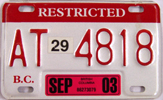 |
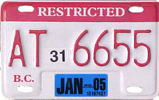 |
|
Only
adding the peculiarity of the Restricted plate was the creation
of a new serial format - "00000-X" - around 2001
or 2002 (a serial that should have been reserved for the
Industrial Vehicle base). |
It
is thought that the purpose of the plate was to continue
the series following the exhaustion of the "AT"
prefix. However, in the years since it first appeared on
the Corporation's Licence Plate Identification Guide,
the "X" suffix plate was not seen on
the road and was thought to be a 'ghost plate'. |
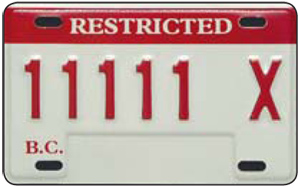 |
The plate at left is taken from the Corporation's Licence Plate Identification Guide and was the only known example of the 'X' suffix prior to 2010. |
|
In 2010, however, the first verifiable spotting of an "X" plate occurred, with the number being "00-350X" - which is very low considering that this plate has theortically been available for most the past ten years. Of even more interest was that the dies are Astrographic - a firm that hasn't been producing plates for BC for about 7-8 years.
|
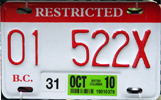 ASTROGRAPHIC DIES
ASTROGRAPHIC DIES |
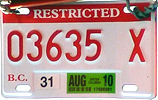 WALDALE DIES
WALDALE DIES |
|
As can be seen in the two examples above, the switch over from Astrographics to Waldale dies has occurred somewhere between "01500X" and "03600X".
|
The other interesting difference between the two plate manufacturers has been the spacing between the numbers and letter 'X' with Astrographic opting for a '00-000X' spacing (similar to that on the "AT" plates) and Waldale for a '00000-X'. The only other design modification that is apparent is the inclusion of a white band around the outside edge of the "RESTRICTED" bar at the top of the plate on the Waldale version.
|
Interestingly,
the Licence Plate Identification Guide had previously referred to the "AT"
plates as being for "Restricted ATV", but following
the introduction of the "X" plates simply referred
to both as being "Restricted". |
| 2009 - present: Restricted ('X' suffix) |
|
|
|
|
|
|
|
|
|
|
|
|
|
| The Tides of Change (2009-2014) |
| On
November 10, 2009, it was announced by the (then) Minister of Tourism,
Culture and the Arts, Kevin Krueger, that new rules for
Off-Road Vehicle (ORV) registration would be implemented
over the course of the next two years (ha!). |
|
According
to Krueger, "we’ve heard much from ORV groups,
the public, and other stakeholders, including the chief
coroner and the Union of BC Municipalities on this topic.
There is a broad consensus that it is time for ORV regulations;
we have a common vision and a solid blueprint for action.”
|
| Of
interest to plate spotters is that, under the new framework,
all ORV riders using Crown land will require one-time registration
with a licence plate for their machines. Moreover, all ORVs
will require registration and licensing at time of sale
and re-sale. |
The necessary amending legislation was not to be introduced until 2014 and on November 17, 2014, the new Off-Road Vehicle license plate was introduced: |
|
To read more about these plates, visit our new "Off Road Vehicle" page. We suspect that this is going to fundamentally alter the issuance of the Restricted plates which were already scare enough but are not going to become even more rare. |
| The
Archives of the Unknown |
|
|
The use of
the plates shown above appears to be fairly self-evident,
however, it remains unclear as to whether these plates
were ever actually used, or are simply a series of prototypes
produced for the MVB in the early 1970s.
|
Available
records make no reference to such plates and the two shown
abaove are the only examples this writer is familiar with. |
Very
little is also known about these decals, which also purport
to be for use on ATV's. |

© Copyright Christopher John Garrish. All rights
reserved.
|